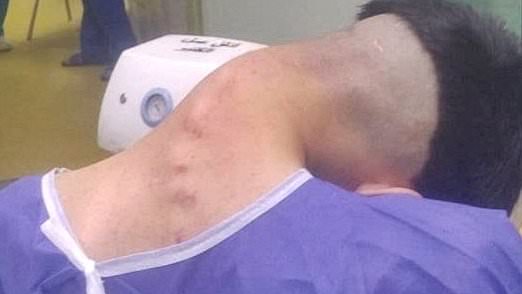Share this @internewscast.com
Shocking images have revealed a little-known, devastating effect of heavy drug use — a terrifying condition known as dropped head syndrome.
The pictures, published by doctors at the Alzahra hospital in Isfahan, Iran, show a 23 year-old man with an extreme bend in his neck, which developed after several years of substance abuse.
The dangerous combination of drugs had caused significant rounding of the spine until the neck could no longer support the head.
Dropped head syndrome—also know as floppy head syndrome— is characterised by severe weakness of the neck muscles, and is most commonly associated with neuromuscular disorders, such as motor neurone disease.
But doctors now say that the syndrome could be caused by substance abuse.
The medics reported that use of amphetamine (also known as speed) triggered what they called a fixed kyphotic neck position, where his chin fell to his chest for long periods of time.
He also experienced chronic neck pain and paresthesia—the feeling of tingling, numbness, or pins and needs—in his arms.
Whilst the patient had no history of severe neck trauma that could explain his symptoms, he had a significant history of depression and the use of amphetamines, opium and heroin.

Dropped Heady Syndrome is a rare medical disorder, where the neck muscles become so weak they can no longer support the head against gravity
The doctors noted that prior to this history of addiction, there was no malalignment in his neck.
Dr Majid Rezvani, co-author of the case study, said: ‘We discovered that drug abuse contributed to the uncommon development of severe complicated cervical kyphosis [excessive rounding of the upper back].’
‘The drug does not have a direct effect on musculoskeletal changes’, he explained.
‘Instead there is an indirect effect: when the patient uses the drug, they remain in a certain position for a long time, and over months this results in musculoskeletal changes that led to kyphoscoliosis’.
According to the report, the man suffered with symptoms for over 15 months, which he attempted to treat using herbal remedies, before seeking professional help.
Despite this, cranial nerve tests, muscle strengths tests and tests of his autonomic nervous system—which regulates involuntary processes such as heart rate—all came back clear.
A CT scan revealed that he had a severely deformed spine.
Initially, the patient was placed under general anesthesia, and doctors noted that this appeared to be enough to reduce his neck deformity.
However, doctors were unable to correct the patient’s neck into the desired position, so a surgical approach was selected.
In order to re-adjust the position of the neck, doctors decided to remove the deformed bone and used a locking cage to support the neck.

The unnamed patent reportedly used heroin, opium and amphetamines

Post-operative CT showing screws used to stabilise the neck
The surgery was successful and no neurological symptoms were observed. His limb strength was also 100 per cent.
The day after surgery the patient was able to walk with the support of a hard collar, which he consistently wore for three months.
The 23-year-old attended therapy and rehab after his surgery, which has enabled him to overcome his drug addiction.
He has since had a follow-up appointment at the hospital in Iran and doctors are satisfied that the correction of the spine was effective.
Doctors working on the case have now proposed the term ‘intoxicated syndrome’ for patients presenting with these symptoms.
Those affected by the issues raised in this article can seek confidential help and support via Talk to Frank.












